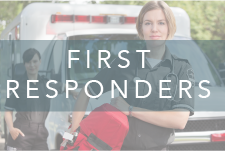Keeping Hold of Your Identity While off Duty
- CCDT Staff
- Jan 31, 2022
- 4 min read
Updated: May 12, 2022
First responders make up the cornerstone of the communities they protect and serve. Constant vigilance and service are major parts of a first responder's identity. However, despite the fact that their bravery and selflessness are often championed, first responders are still people beyond their job title.
It is important to explore their personal identity while off duty as much as they cultivate their on-duty personas of strength and protection. Finding a way to explore one's identity, interests, and hobbies without becoming encompassed by one's workplace identity is essential for maintaining a healthy balance between a dangerous line of work and one's own mental health.
How the Job Defines the Person
First responders are in a unique position as their occupation always puts them in the public eye, making their job even more stressful and paired with large expectations. One's identity as a first responder can be seemingly dictated by these expectations of strength, selflessness, heroism, and more, which are reinforced by their communities. One's acts of courage and sacrifice are constantly and deservedly brought up as noble traits.
However, these constant notions can also overshadow other aspects of an individual's identity, even when one is not in the field. It can bleed into one's personal and familial lives or compromise one's identity to maintain this persona, often to the detriment of one's hobbies and energy.
Finding a way to separate oneself from these imposed aspects of one's identity is necessary. This does not mean an individual needs to forgo their first responder persona – rather, it helps first responders explore other aspects of their lives while providing space for personal freedom and expression. Additionally, it can help mitigate unnecessary stress or the risks of fatigue or burnout in the field.
The Dangers of Being Defined by Your Job
One's job is a major part of who they are, but it is not everything. A first responder's occupation is a volatile environment, filled with unexpected emergencies, tragedy, and turbulence. While the job is necessary for the continued betterment of one's community, it comes with a myriad of risks to one's mental, emotional, and physical health. Being defined by this job can further add to these pervasive stresses.
First responders are prepared for anything. However, in the midst of emergencies and disasters, it can feel incredibly difficult to be in control of anything, especially when natural disasters or unexpected confrontations are commonplace. Defining oneself wholly by their job as a first responder can extend these feelings, making one feel out of control of their own life – a stressful, exhausting notion that can be detrimental to one's health.
Set Clear Boundaries at Work
Setting boundaries with one's job or coworkers is essential to exploring one's identity outside of the workplace. While the bonds that first responders share feel unbreakable, it is still important to allow oneself distance from these brothers and sisters.
Choosing to take time for oneself rather than go out with work friends a few days a week can provide the necessary physical and emotional distance from one's job that allows an individual to explore other interests for themselves.
This can also be extended to learning to take time off. Vacations, or even short breaks, are essential to balancing one's mental health, and while the nature of one's job can make it feel incredibly difficult to take time off, using one's hard-earned and deserved vacation time is instrumental in further exploring one's identity.
Celebrate Personal Victories
Being a first responder can put many aspects of one's life in context. While learning a new cooking skill or finishing an art project can feel rather small in comparison to one's duties and accomplishments in the field, they are still worthy of just as much celebration. Taking time to revel in these accomplishments and treat them like the true successes they are, reinforces the idea that an individual is not just allowed, but encouraged, to continue pursuing their personal hobbies outside of their workplace identity.
Set Goals Early
Setting personal goals, such as learning a new skill, joining a sports club, delving into musical interests and concerts, taking the family out for a trip, or revisiting the fun and innocence of one's childhood games and hobbies, are all valid goals. Setting goals to engage in these things can make it much easier to actively work into one's schedule. Trying to reactively make time for one's hobbies amid one's tumultuous job obligations can often leave these activities on the cutting room floor.
Preparing to engage in personal interests ahead of time can help justify one's time and encourage an individual to engage. This also ensures that each first responder is taking the time to balance and prioritize their personal lives just as much as their professional ones.




